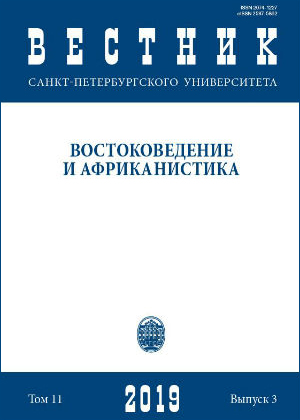Dialect Usage as a Means of Identity in Hausa Film Discourse
DOI:
https://doi.org/10.21638/spbu13.2019.308Аннотация
Анализируется аспект языка и идентичности в фильмах на языке хауса. В научной литературе язык часто рассматривается как символ этнической, национальной или региональной идентичности. Диалекты — это разновидности одного и того же языка, которые отличаются друг от друга с точки зрения словарного запаса, грамматики и произношения. В большинстве случаев один диалект понятен носителю другого диалекта. Использование определенного диалекта говорящим раскрывает его/ее личность с точки зрения географического местоположения говорящего или социального статуса. Исследуется использование диалекта в кинодискурсе на языке хауса. Основное внимание уделяется способам общения персонажей в фильмах на хауса, которые раскрывают их индивидуальность. Этнографический метод используется для сбора данных, теория социальной идентичности — для их анализа. Определены четыре диалекта хауса, используемые персонажами фильма для общения и демонстрации своей идентичности: Katsinanci, Sakkwatanci, Zazzaganci и Kananci. Проведенное автором исследование показывает, что некоторые герои фильмов бессознательно используют свой диалект вместо стандартного хауса, который является языковой нормой, обычной в дискурсе фильма. Автор также показывает, что персонажи в фильмах на хауса чаще всего говорят на своих диалектах, когда находятся в эмоциональных ситуациях, таких как гнев, разочарование или романтическое настроение. Кроме того, показано, что некоторые герои фильмов на хауса не следуют языковым нормам из-за низкой академической квалификации и пожилого возраста.
Ключевые слова:
язык, идентичность, диалект, фильмы на языке хауса
Скачивания
Библиографические ссылки
Загрузки
Опубликован
Как цитировать
Выпуск
Раздел
Лицензия
Статьи журнала «Вестник Санкт-Петербургского университета. Востоковедение и африканистика» находятся в открытом доступе и распространяются в соответствии с условиями Лицензионного Договора с Санкт-Петербургским государственным университетом, который бесплатно предоставляет авторам неограниченное распространение и самостоятельное архивирование.





